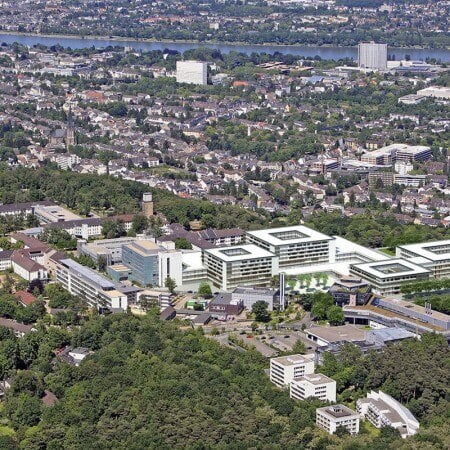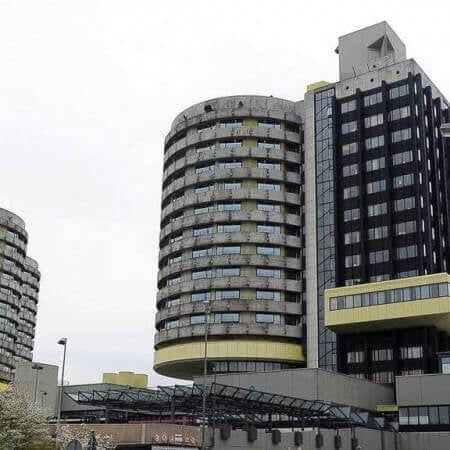A perirenal abscess is a rare but severe disease that has a high mortality rate and threatens a person with the loss of a kidney. Timely treatment of a perirenal abscess allows patients to get rid of this disease without any complications. You can undergo your treatment abroad to expect the best results. In most cases, doctors manage to preserve the kidney, and when treating a perirenal abscess, preference is given to minimally invasive techniques instead of open surgery. You are welcome to use the Booking Health service to find out the cost of treatment at different hospitals, compare prices, and make an appointment for your treatment abroad at the best price.
Content
- Description of the disease
- Diagnostics
- Surgical treatment of a perirenal abscess
- Conservative treatment of a perirenal abscess
- Why is it best to undergo treatment at foreign university hospitals?
Description of the disease
A perirenal abscess is a collection of pus in fatty tissue near the kidney. Its most common cause is an ascending urinary tract infection with pyelonephritis (purulent inflammation of the pyelocaliceal system of the kidney). Gram-negative bacteria, such as Escherichia coli, are the most common pathogens.
An abscess can rarely develop due to the hematogenous spread of infection from other parts of the body. In this case, the most common causative agent is Staphylococcus aureus.
The risk of developing an abscess is higher in patients with concomitant diseases, such as diabetes mellitus, obesity, developmental anomalies of the urinary tract, or kidney stone disease. Another risk factor is pregnancy.
An abscess looks like a cavity filled with pus. To delimit the focus of inflammation in the perirenal fiber from healthy tissues, protective mechanisms are activated, namely a capsule is formed due to fibrin deposits.
If the treatment of a perirenal abscess is not timely provided, the lesion may increase and adjacent tissues may also be involved in the process. Due to the spread of inflammation beyond the perirenal fiber, sepsis and septic shock may develop.
Diagnostics
Doctors can see an abscess with the use of medical imaging techniques:
- an ultrasound scan;
- a CT scan;
- an MRI scan.
In most cases, an ultrasound examination is sufficient. With this method, doctors can confirm the presence of an abscess, reliably distinguish it from cysts, tumors, and other neoplasms, and assess its size and location.
A CT scan is a less commonly used diagnostic procedure. This method is more accurate than ultrasound scanning. It can be helpful in deciding whether to treat a patient with open surgery or a minimally invasive procedure.
An MRI scan is a very rare diagnostic option. This examination can be carried out for the differential diagnostics of an abscess and a tumor. These diseases can usually be distinguished with ultrasound scans and laboratory tests that show signs of an acute infectious inflammation in the body.
The examination includes laboratory diagnostics. When preparing for surgery, patients have general clinical tests. After receiving pus during a percutaneous puncture or surgery, the material will be placed on a nutrient medium to determine the type of pathogen and assess its sensitivity to antibiotics.
Surgical treatment of a perirenal abscess
Without exception, doctors provide the treatment of a perirenal abscess to all patients with surgery. The objective of the surgical procedure is to evacuate pus and create favorable conditions for tissue healing.
Percutaneous drainage is a minimally invasive option for the treatment of a perirenal abscess, which is considered the main one in developed countries. This is a sparing procedure that rarely causes any complications and does not require long-term rehabilitation. Doctors puncture the patient's skin with a thick needle, insert it into the purulent focus, and evacuate the pus. Doctors can inject drugs inside the focus to kill microbes and enzymes, anti-inflammatory and other drugs. Doctors leave drainage in the wound for a constant outflow of pus and inflammatory exudate. If the abscess is large, doctors may implant multiple drains. They persist as long as the volume of excreted fluid remains significant. A few days after the percutaneous treatment of a perirenal abscess, the drains will be removed.
Surgical drainage is a more traumatic but reliable treatment of a perirenal abscess, which is performed if doctors cannot achieve the desired result with a minimally invasive method. The operation is performed through an incision in the skin and soft tissues. Doctors remove dead tissue, evacuate pus, apply antiseptics and then suture the wound, leaving drains in it for the outflow of inflammatory fluid.
Nephrectomy is an operation to remove a kidney. It is a rare option for the treatment of a perirenal abscess in developed countries. Doctors try to save the organ at least partially, even if it is largely involved in the inflammatory process. But it happens that at the time of seeking medical help, the kidney is practically destroyed, and the purulent focus threatens the patient's life. In this case, when dealing with the treatment of a perirenal abscess, doctors resort to radical surgery.
Conservative treatment of a perirenal abscess
The use of antibacterial medicinal drugs is important for the successful treatment of a perirenal abscess, but still, conservative therapy cannot be used as a stand-alone treatment method. It is an addition to the surgical treatment of a perirenal abscess.
Antibiotics can destroy the bacterial flora that has caused inflammation and stop the spread of the purulent process. Initially, doctors conduct antibiotic therapy empirically, which means that it is directed against the most common pathogens of infection of the kidney and perirenal fiber.
A few days later, doctors receive the results of bacteriological diagnostics. Now they know not only the types of bacteria that have caused kidney inflammation but also have information about the sensitivity of the isolated flora to various antibiotics. Based on this information, the treatment will be adjusted if initially it is not effective enough.
Medicinal drugs to suppress a kidney infection are initially administered intravenously. After a few days, when there are signs of a reduced inflammation near the kidney and most of the clinical manifestations of the disease disappear, doctors switch to oral forms of antibiotics. After drain removal and stabilization of the patient's condition, further treatment of a perirenal abscess will be carried out on an outpatient basis.
Why is it best to undergo treatment at foreign university hospitals?
There are university medical centers operating abroad that are well equipped and have the best doctors on their staff. You can get medical care at the University Hospital of Ludwig Maximilian University of Munich, the University Hospital Ulm, the Charite University Hospital Berlin, and other university centers that show excellent results in the treatment of a perirenal abscess.
The advantages of treatment at university hospitals abroad are as follows:
- university hospitals employ the best doctors;
- university hospitals have state-of-the-art equipment;
- whenever possible, doctors prefer a minimally invasive method for the treatment of a perirenal abscess;
- safe surgery with good results;
- in the vast majority of cases, an organ-preserving treatment of a perirenal abscess is performed (doctors manage to preserve the kidney);
- after treatment, patients at university hospitals are provided with adequate pain relief, medical supervision, rehabilitation, and symptom relief.
You are welcome to undergo your treatment at one of the university hospitals in Germany or other developed countries. On our website, you can find out the cost of treatment and choose a program at a favorable price. The specialists from the Booking Health company will help you choose the best university hospital for your treatment abroad. The waiting period to start your treatment of a perirenal abscess will be shortened, which is very important in any acute disease that progresses rapidly.
The Booking Health website shows the actual cost of treatment at different hospitals. You can immediately make your treatment appointment on your preferred dates at the specified price. When making an appointment through Booking Health, the cost of treatment will be lower than when contacting a university hospital directly. The prices are reduced due to the absence of taxes for foreign patients.
Authors:
The article was edited by medical experts, board certified doctors Dr. Nadezhda Ivanisova and Dr. Sergey Pashchenko. For the treatment of the conditions referred to in the article, you must consult a doctor; the information in the article is not intended for self-medication!
Sources:
MedicineNet
Web MD
PubMed

















